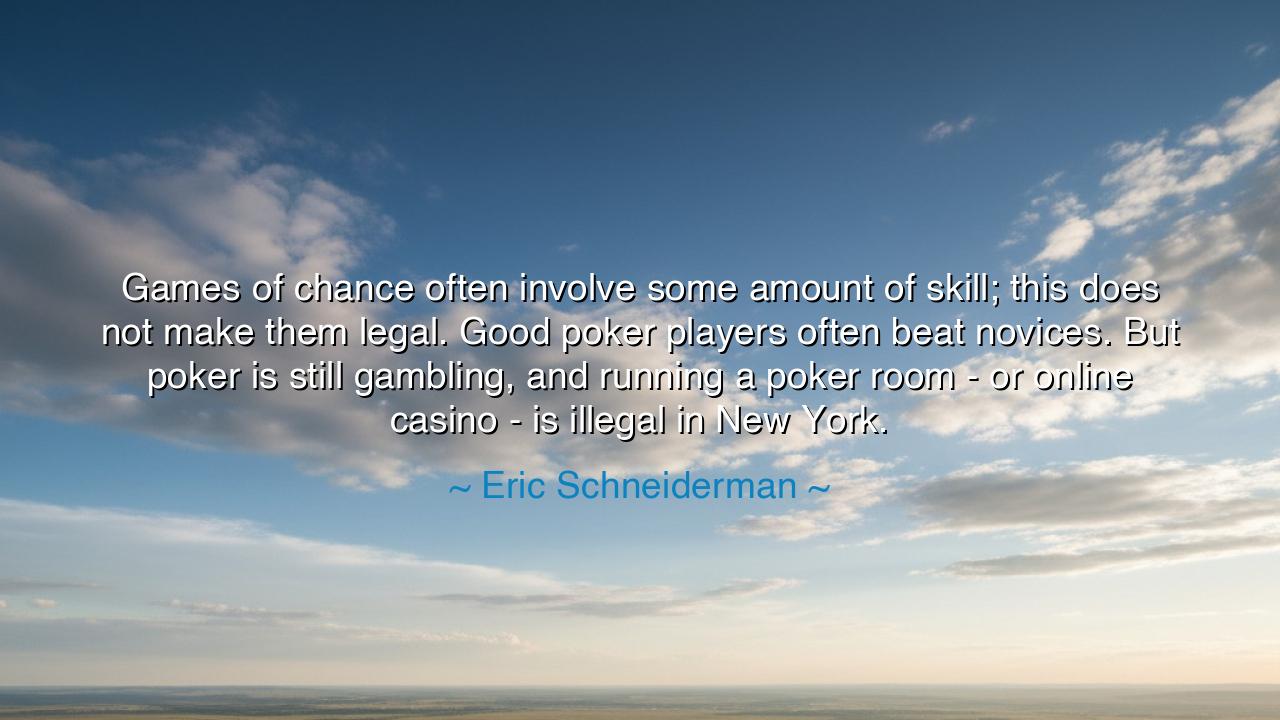
Games of chance often involve some amount of skill; this does not
Games of chance often involve some amount of skill; this does not make them legal. Good poker players often beat novices. But poker is still gambling, and running a poker room - or online casino - is illegal in New York.






In the annals of human society, the interplay of chance and skill has always been a matter of fascination and regulation. Eric Schneiderman’s words, “Games of chance often involve some amount of skill; this does not make them legal. Good poker players often beat novices. But poker is still gambling, and running a poker room - or online casino - is illegal in New York,” illuminate a principle as ancient as human law itself: that the presence of talent or expertise does not absolve one from the constraints of legality. Across generations, rulers and legislators have sought to balance personal freedom with societal protection, understanding that the allure of chance can be as perilous as it is enticing.
From the dice games of ancient Mesopotamia to the betting practices of medieval Europe, humankind has long recognized that games of chance, while sometimes requiring skill, carry inherent risks to the social order. The gambler who masters technique may win often, yet the underlying uncertainty remains, threatening both fortune and moral conduct. Schneiderman’s reflection underscores this enduring truth: skill may enhance outcomes, but legality and social responsibility are determined not by talent, but by law.
History provides vivid illustration. In 17th-century England, gaming houses thrived in cities like London, where skilled players could dominate novices. Yet Parliament and the Crown sought to suppress such establishments, recognizing that even the most adept player cannot change the fundamental nature of gambling and its potential to disrupt social stability. Like the poker rooms in modern New York, these venues were eventually regulated or banned, demonstrating that the law distinguishes between personal skill and collective risk.
Consider a contemporary example: the online poker boom of the early 2000s. Skilled players could consistently outmaneuver novices, turning talent into profit. Yet despite their expertise, the operators of online casinos faced prosecution for violating state gambling laws. Schneiderman’s words remind us that the law evaluates the nature of the enterprise as a whole, not merely the skill of individuals participating within it. Running a poker room or digital casino is an act governed by statutory authority, and violations carry consequences regardless of the proficiency of the players.
The philosophical lesson embedded in this principle is timeless. Human ingenuity and mastery do not exempt one from ethical and legal frameworks. Just as ancient philosophers taught that virtue and wisdom must guide action, modern law insists that skill does not justify the circumvention of rules designed to protect the community. A game may entertain and reward, but it does not exist outside the sphere of societal accountability.
Practically, this teaching extends beyond gambling. In business, finance, or personal pursuits, talent and expertise cannot replace adherence to law or ethical standards. One may innovate, strategize, or excel, but the legitimacy of these actions depends upon recognition by the governing frameworks. The law is not a measure of skill alone, but a structure that preserves fairness, security, and trust within society.
For citizens and participants alike, Schneiderman’s insight calls for prudence. Recognize the difference between personal competence and legal compliance. Engage in activities responsibly, respect regulatory boundaries, and understand that even if one can excel, operating outside the law exposes both oneself and others to harm. Mastery, when paired with legality, becomes both virtuous and enduring; mastery without compliance invites peril.
Thus, Eric Schneiderman’s words resound as an enduring admonition: skill does not excuse illegality, and talent cannot sanctify transgression. Let those who gamble, compete, or innovate remember that the law seeks to protect the collective, not to limit individual prowess. In this lies a timeless truth: wisdom lies in harmonizing mastery with responsibility, ensuring that one’s abilities are exercised within the bounds of justice and order, for the good of both self and society.






AAdministratorAdministrator
Welcome, honored guests. Please leave a comment, we will respond soon